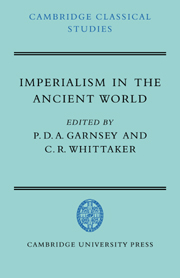Book contents
- Frontmatter
- Contents
- List of figures
- Preface
- 1 INTRODUCTION
- 2 IMPERIALISM AND EMPIRE IN NEW KINGDOM EGYPT
- 3 CARTHAGINIAN IMPERIALISM IN THE FIFTH AND FOURTH CENTURIES
- 4 SPARTAN IMPERIALISM?
- 5 THE FIFTH-CENTURY ATHENIAN EMPIRE: A BALANCE SHEET
- 6 ATHENS IN THE FOURTH CENTURY
- 7 THE ANTIGONIDS AND THE GREEK STATES, 276–196 B.C.
- 8 LAUS IMPERII
- 9 GREEK INTELLECTUALS AND THE ROMAN ARISTOCRACY IN THE FIRST CENTURY B.C.
- 10 THE BENEFICIAL IDEOLOGY
- 11 ROME's AFRICAN EMPIRE UNDER THE PRINCIPATE
- 12 JEWISH ATTITUDES TO THE ROMAN EMPIRE
- Notes
- Bibliography
- Index
12 - JEWISH ATTITUDES TO THE ROMAN EMPIRE
Published online by Cambridge University Press: 05 June 2014
- Frontmatter
- Contents
- List of figures
- Preface
- 1 INTRODUCTION
- 2 IMPERIALISM AND EMPIRE IN NEW KINGDOM EGYPT
- 3 CARTHAGINIAN IMPERIALISM IN THE FIFTH AND FOURTH CENTURIES
- 4 SPARTAN IMPERIALISM?
- 5 THE FIFTH-CENTURY ATHENIAN EMPIRE: A BALANCE SHEET
- 6 ATHENS IN THE FOURTH CENTURY
- 7 THE ANTIGONIDS AND THE GREEK STATES, 276–196 B.C.
- 8 LAUS IMPERII
- 9 GREEK INTELLECTUALS AND THE ROMAN ARISTOCRACY IN THE FIRST CENTURY B.C.
- 10 THE BENEFICIAL IDEOLOGY
- 11 ROME's AFRICAN EMPIRE UNDER THE PRINCIPATE
- 12 JEWISH ATTITUDES TO THE ROMAN EMPIRE
- Notes
- Bibliography
- Index
Summary
In any attempt to understand the attitudes of subject peoples to Roman rule, the Jewish evidence cannot be ignored. The surviving literature is ample, and spans the whole period of Roman rule. Its authors were literate and articulate, and many of them played a leading part in political events. The result is, for him who has eyes to see, a vivid and intimate picture of provincial life and attitudes. But it is not an easy picture to interpret. Much of the material is fragmentary in form. It has an esoteric character, being written for initiates. It tends to avoid the explicit, to prefer the hint, the allegory. There is little straightforward historical writing; instead we have snatches of dark prophecies, of homilies, of commentaries on ancient texts. The overall effect is frequently frustrating, and it is small wonder that the material has been so little exploited.
Perhaps the very inwardness of the Jewish literature militates against its use as a guide to provincial attitudes to Roman rule. The Jews are a peculiar people; they have never been able to keep religion out of politics. The combination is sometimes bizarre and often bewildering to the sober political historian. Yet in a sense every people is a peculiar people, and the ‘uniqueness’ of Jewish-Roman relations can be exaggerated. The history of the Jews under Roman rule presents special features, especially when viewed in the long perspective; but the Judaeans were also Roman provincials, and shared many problems with provincials everywhere.
- Type
- Chapter
- Information
- Imperialism in the Ancient WorldThe Cambridge University Research Seminar in Ancient History, pp. 255 - 282Publisher: Cambridge University PressPrint publication year: 1979
- 43
- Cited by

